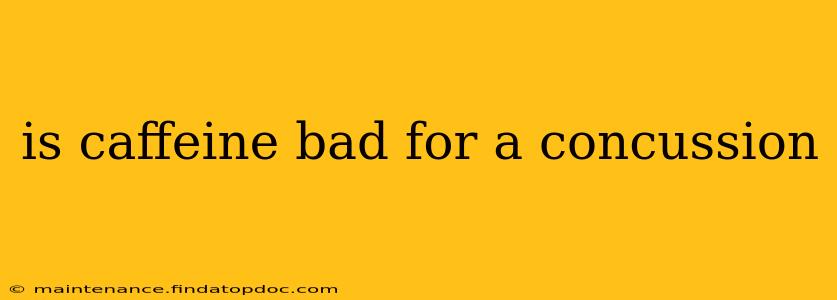A concussion, a type of traumatic brain injury (TBI), disrupts the normal function of your brain. While recovery varies greatly from person to person, one common question many individuals have revolves around caffeine consumption. Is caffeine bad for a concussion? The short answer is: it's complicated, and there's no definitive "yes" or "no." The effects of caffeine on concussion recovery are still being researched, and the optimal approach depends heavily on the individual and the severity of the injury.
What Happens to Your Brain After a Concussion?
Before diving into caffeine's role, let's understand what a concussion does to your brain. A concussion causes a cascade of effects, including:
- Neurochemical imbalances: The delicate balance of neurotransmitters and other chemicals in your brain is disrupted.
- Inflammation: The brain experiences inflammation, potentially exacerbating symptoms.
- Cellular dysfunction: Brain cells may malfunction, leading to cognitive, emotional, and physical symptoms.
These changes can manifest in various ways, including headaches, dizziness, nausea, sensitivity to light and sound, cognitive impairment, and emotional lability.
Can Caffeine Worsen Concussion Symptoms?
Caffeine is a stimulant that affects the central nervous system. Some studies suggest that caffeine might worsen certain concussion symptoms in some individuals. This is because:
- Increased anxiety and irritability: Caffeine can heighten anxiety and irritability, which can already be exacerbated by a concussion.
- Sleep disturbances: Caffeine can disrupt sleep patterns, and adequate sleep is crucial for brain healing. Sleep deprivation can worsen concussion symptoms.
- Headache exacerbation: While caffeine can sometimes alleviate headaches in healthy individuals, it can potentially worsen headaches in those with concussions. This is likely because caffeine can increase blood flow, potentially increasing pressure within the already sensitive brain.
- Dehydration: Caffeine is a diuretic, meaning it increases urination. Dehydration can hinder recovery.
Does Caffeine Help with Concussion Recovery?
Conversely, some argue that moderate caffeine consumption might offer benefits during concussion recovery. This is based on the theory that:
- Improved alertness and focus: Caffeine can increase alertness and concentration, potentially assisting with cognitive tasks. However, this benefit needs to be carefully weighed against the potential for increased anxiety and sleep disturbances.
What is the Recommended Approach to Caffeine After a Concussion?
The most prudent approach is to consult with a healthcare professional. They can assess the severity of your concussion and consider your individual medical history and sensitivities before advising on caffeine intake.
Factors they may consider include:
- Severity of the concussion: More severe concussions generally necessitate stricter limitations on stimulants.
- Pre-existing conditions: Pre-existing conditions can influence the body's response to caffeine.
- Individual response: Everyone reacts to caffeine differently.
Generally, it is advisable to limit or avoid caffeine in the initial stages of recovery from a concussion. As you progress, you might cautiously reintroduce small amounts of caffeine, monitoring for any negative effects.
What if I'm already experiencing symptoms?
If you're experiencing concussion symptoms and are concerned about caffeine's impact, it's vital to speak with a medical professional immediately. They can assess your condition and help create a personalized plan to manage your symptoms effectively.
How long should I avoid caffeine after a concussion?
There's no one-size-fits-all answer. The duration of caffeine avoidance or limitation depends entirely on the individual's recovery process and medical advice.
Are there any alternative ways to improve alertness and concentration after a concussion?
Yes! Prioritizing sufficient sleep, practicing relaxation techniques, and engaging in gentle exercise (as advised by your doctor) are all safer and more effective approaches to improving alertness and concentration during recovery.
By carefully considering the potential benefits and risks, consulting with healthcare professionals, and prioritizing a holistic approach to recovery, individuals can navigate the complexities of caffeine consumption following a concussion safely and effectively. Remember, prioritizing rest, and gradual reintegration of activities, is essential for optimal recovery.
